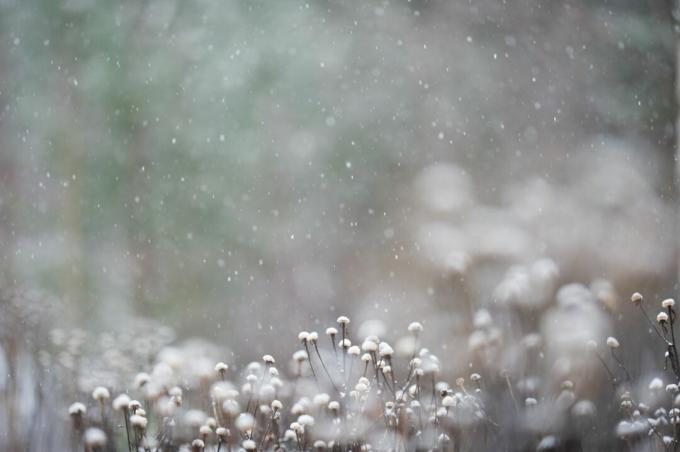Not all daisy species are hardy - so at the end of summer you have to take protective measures for some daisies.

So that all kinds of daisy (Leucanthemum) survive frost, certain measures must be taken. Here you can find out which daisies are hardy and which are not, whether the daisies can overwinter in the pot and what you have to consider there or in the bed. You can read general information about daisies in our daisy overview article.
Contents
- Which daisy species are hardy?
-
Overwinter daisies properly
- Overwinter daisies in the bed
- Overwinter daisies in pots
Which daisy species are hardy?
The single ones Marguerite types and varieties differ in their winter hardiness. The single ones hardiness zones indicate in which temperature range the respective species can still survive the winter. Some beautiful varieties that are considered hardy include:
- dry meadow daisy (Leucanthemum vulgare): about – 40 °C to – 35 °C, winter hardiness zone 3
- Fat Meadow Marguerite (Leucanthemum ircutianum): about – 40 °C to – 35 °C, winter hardiness zone 3
- garden daisy (Leucanthemum maximum): about – 23 °C to – 18 °C, winter hardiness zone 6
- Large-flowered garden daisy (Leucanthemum x superbum): about – 23 °C to – 18 °C, winter hardiness zone 6
- Narrow-leaved Marguerite (Leucanthemum graminifolium): about – 18 °C to – 12 °C, winter hardiness zone 7
Tip: The Moroccan Marguerite (Rhodanthemum hosmariense), Colorful Marguerite (Tanacetum coccineum) and shrub daisies (Argyranthemum frutescens) do not belong to the genus of daisies (Leucanthemum) – even if they are trivially called daisies. The colorful marguerite is assigned to winter hardiness zone 5, so it is hardy down to temperatures of around -25 °C. The Moroccan daisy withstands frosts down to a maximum of -10 °C, while the commonly used shrub daisy can only tolerate very mild temperatures in the small single-digit minus range. To help the Marguerite and Marguerite survive the winter, the soil in the Cover the area around the daisy with leaves or fir branches and wrap the bush in jute become.

Overwinter daisies properly
Even if a species of daisy is hardy to -38 °C, for example, it cannot with certainty survive the cold winter. Winter hardiness is not only genetically determined, but also depends on how the marguerite is cared for.
The type of fertilizer plays an important role in the wintering of the marguerite. In order to influence the frost resistance of the plant, more potassium can be fertilized in August and September. The plant nutrient lowers the freezing point of the plant cells and thus serves as a natural antifreeze. Since nutrients can only be absorbed effectively at sufficiently high temperatures, this autumn fertilization must not be carried out too late in the autumn. Our high-potassium Plantura Organic Autumn Lawn Fertilizer could be used for this.
In addition, waterlogging should be avoided in mild, rainy winters, otherwise the roots can easily rot, so that the plants die even without frost.

Organic autumn lawn fertilizer 10.5 kg (bag)
- Ideal for lawn fertilization from July to October
- Ensures maximum winter hardiness & rapid regeneration in spring
- Animal-free organic slow-release fertilizer - safe for pets and garden animals
In winter and late autumn, watering should be significantly less and no more fertilizing, so as not to provoke late, less frost-hardy shoot growth.
Tip: Fertilizing with nitrogen in late summer or autumn can lead to more leaf growth and the Reduce the winter hardiness of the daisy - so only use it at this time of year potassium-rich fertilizers.

Overwinter daisies in the bed
In the bed, the hardy daisy species can with the right Marguerite care survive without problems. However, the location of the plant also has an impact on how well they survive the winter. It is better if the daisy is planted in a rather sheltered place. It can also help daisies in hardiness zones Z6 and Z7 to cover the soil around the daisy with leaves or fir branches during the winter. It is best not to use damp or soaking material here to reduce the risk of fungal infections. If you prune your daisies in winter, care should be taken not to cut them too low. It is best not to make the shoots shorter than 15 cm above the ground.

Overwinter daisies in pots
In general, it can be said that daisies can hardly survive the winter in a pot. The earth around the roots of the marguerite protects against the cold - in the plant pot it has too little volume and therefore offers no protection. In severe frost, the vessel could simply freeze through.
In autumn, about two thirds of the daisies in the pot should be cut back. If you then place the marguerite in a frost-free, cool and bright room below 10 °C, it can overwinter there. Cold hallways, garages, sheds and unheated greenhouses are often well suited. In order not to overwhelm the plant with late frosts, it is best to plant the marguerite in spring first put them in a slightly warmer room and then only put them outside again from April bring. If the plant is overwintered too warm, it may sprout in its winter quarters. If that happens, it's important to protect them from direct sunlight initially to avoid sunburn.

Even if daisies can survive the winter well, with the Planting the daisies wait until spring.
Register now for the Garten-Post and receive great tips, seasonal trends and inspiration on everything to do with the garden from our expert every week.
